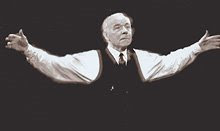 George Bartenieff fled Nazi Germany with his dancer parents in 1939. A classically trained Shakespearean actor, Bartenieff joined the Judson Poets Theater in 1962 and founded the Theater for the New City, which got it’s start in Westbeth in 1970. Bartenieff’s most recent project is a one-man show of Victor Klemperer’s Holocaust diary, “I Will Bear Witness,” written by his partner, the playwright Karen Malpede.
George Bartenieff fled Nazi Germany with his dancer parents in 1939. A classically trained Shakespearean actor, Bartenieff joined the Judson Poets Theater in 1962 and founded the Theater for the New City, which got it’s start in Westbeth in 1970. Bartenieff’s most recent project is a one-man show of Victor Klemperer’s Holocaust diary, “I Will Bear Witness,” written by his partner, the playwright Karen Malpede.When I was 11, my mother took me to see a play of “Jack and the Beanstalk.” I turned to her and said, “This is what I want to do.” When I was 14, I got a role in a Broadway play directed by Harold Clurman called “The Whole World Over.” I was disillusioned with Broadway right away. I thought of becoming a cabinetmaker, a shoemaker or a tailor. I wanted to do something with my hands. I thought acting was stupid and silly, but at the same time I had a great Shakespeare passion. I went to London and studied at the Royal Academy of Dramatic Arts. I returned to New York in 1955 and did off-Broadway and regional theater.
In 1962, I bumped into a beat poet I knew on the street. He told me about Judson Poets Theater at Judson Church. I thought it was incredible. All the actors around me were poets, writers, composers. They were all brilliant. Between the 1960s to the 1970s, it was an incredible explosion and synthesis of the arts. Judson became a focal point where all the arts came together. Dance became a generator of a lot of other interactions. The visual arts were mixed with poetry and theater. To me, it was heaven. I threw everything out the window. We were paid nothing. It was like we’d all been released from prison.
I had been part of all these theater companies that had great hopes and desires. These companies did not deliver on these wonderful ideas. With my then-partner Crystal Field, Larry Kornfeld and Theo Barnes, we said, “Let’s stop complaining and open a theater.” We wanted to create a theater that would not bullshit, that would only deliver what it said it would deliver. I wanted to continue the synthesis of the art disciplines. We were not to be a theater that happened to be in Greenwich village. We had to be the theater of Greenwich Village.
We got the space in Westbeth. It was a raw space that hadn’t been used since Bell Labs abandoned it. We had “beer and apple” painting parties. Sweat equity means “for nothing.” We got all our seating off the street, from churches throwing out these wonderful seating units. We started with one space, then two, then three. We had the whole building.
There was a big drama. We got the place rent-free for the first 18 months. The Westbeth tenants went through the roof, because they had been promised that the rent from our building would subsidize their rents. They said, “You’ve got to kick them out immediately.” Mrs. Kaplan, who had given us the space, told us, “You’ve got to leave.” I said, “Yeah, but we ain’t got no place to go and we’ve got a lease.” They left us alone. We later moved to the ballroom in an old Swedish officers’ club on Jane Street. It is a story fit for a musical.

